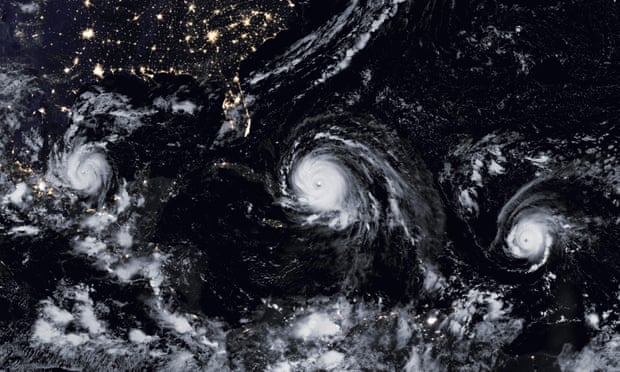Written by Econintersect
Early Bird Headlines 09 September 2017
Econintersect: Here are some of the headlines we found to help you start your day. For more headlines see our afternoon feature for GEI members, What We Read Today, which has many more headlines and a number of article discussions to keep you abreast of what we have found interesting.

Please share this article – Go to very top of page, right hand side for social media buttons.
Global
- Hurricane Jose: storm ‘almost category five’ as it follows Irma’s destructive path (The Guardian) The system is nearing the eastern Caribbean islands of Barbuda and Anguilla, promising further devastation in the wake of the giant Irma. It has moved closer to category five strength, with tops winds of 155 mph (250kmh). Jose is even stronger than Irma was at the same stage and geographic position.

- Irma’s destruction: island by island (The Guardian) This is a review of the islands devastated by Irma.
- Bitcoin Crashes On Massive Volume As China Plans To Shut Local Exchanges (Zero Hedge) Having bounced back dramatically from the 20% plunge following China’s ban of ICOs, Bitcoin is getting battered again Friday on very heavy volume as Caixin reports Chinese authorities plan to shut local Bitcoin exchanges.

- Irma – Global Perspective (Twitter) Irma from space.
U.S.
- Republicans see tax reform complicated by Trump deal with Democrats (Reuters) U.S. Republican party lawmakers warned on Friday that President Donald Trump’s legislative deal with Democrats to help hurricane victims and keep the government running for another three months could complicate his next big priority – tax reform. Trump’s sudden shift in strategy hands a clear victory to Senate Democratic leader Chuck Schumer and House Democratic leader Nancy Pelosi and that could slow the Republicans’ legislative agenda, they said.
- When will Hurricane Irma reach Florida? Latest path forecast and damage summary (The Guardian) The date on this article is 10.16 EDT Friday 8 September 2017 and it is already completely out of date. For the latest information about weather (and great weather graphics) follow Sig Silber at GEI.
- Harvey-struck Texas counties face blow to property tax revenues (Reuters) Texas communities flooded by Hurricane Harvey could see their property tax revenues sink, a financial blow that would leave many cities and counties struggling for years. Property taxes are the top source of revenue for local governments in Texas, which depend on it to fund schools, roads and other public services.
- Trump Admin Quietly Pushing ‘Small Scale’ LNG Exports That Avoid Environmental Reviews (DeSmog) The Trump administration proposed regulations to expedite the permitting process for natural gas exports from “small-scale” facilities on the Friday before Labor Day. The U.S. Department of Energy (DOE) had proposed an alteration of the rules for the export of “small-scale” liquefied natural gas (LNG) under the Natural Gas Act. The proposal will now be open to a public commenting period set to end October 16. Rick Perry, U.S. Secretary of Energy, said in a press release:
“The Trump Administration is focused on finding ways to unleash American energy and providing a reliable and environmentally friendly fuel to our trading partners who face unique energy infrastructure challenges. The Department of Energy and this Administration are wholeheartedly committed to strengthening the energy security of the United States and our allies.”
- Michael Bennett ‘Roughed Up’ by Las Vegas Police (Twitter) See also next article.
- The Las Vegas Police Union Goes in the Gutter to Attack Michael Bennett (The Nation) Hat tip to Surly01. See also preceding article. The Nation is not impressed with the Las Vegas police department. See Tweet below for department letter re: Michael Bennett:
EU
- Nato chief: world is at its most dangerous point in a generation (The Guardian) The world is more dangerous today than it has been in a generation, the head of NATO has said, days before the mobilisation of an estimated 100,000 Russian troops on the EU’s eastern borders, and as a nuclear crisis grows on the Korean peninsula. Jens Stoltenberg, secretary general of the military alliance, said the sheer number of converging threats was making the world increasingly perilous.
Turkey
- Gauging the aftermath of Turkey’s great intelligence gaffe (Al Monitor) Last week, Al-Monitor reported that militants in Iraqi Kurdistan claimed to have captured two high-level Turkish intelligence officials. Cemil Bayik, one of the top leaders of the outlawed Kurdistan Workers Party (PKK), claimed the officials had been sent to assassinate him. Although Turkish media outlets are strictly controlled by the Turkish government and subservient to President Recep Tayyip Erdogan, the importance of the failed operation is extraordinary and unprecedented in the country’s recent history, and there’s no excuse for the silence of the Turkish mainstream media.
Under normal circumstances, the failure of such an intelligence operation would demand that a high price be paid – maybe not the resignations of myriad government officials, but at least the sacking of spy chief Hakan Fidan, head of Turkey’s National Intelligence Organization (MIT). However, that hasn’t happened.
Egypt
- Shock and confusion in Egypt over US aid cut (Al Monitor) When Donald Trump was elected US president in November 2016, Egyptian President Abdel Fattah al-Sisi was the first world leader to congratulate him on his win amid rife speculation that the Trump era would herald warmer ties with Egypt. After all, this was the man who as a presidential candidate had called Sisi “a fantastic guy” and had publicly lauded the “chemistry” between them. A little over seven months into Trump’s presidency, the United States has announced it will cut nearly $100 million in economic and military aid and withhold nearly $200 million more in military financing to its key Middle Eastern ally, owing to what it said was Egypt’s poor human rights record. The controversial US decision took many by surprise, not least the Sisi government, which reacted with shock, confusion and restrained anger.
Cuba
- Hurricane Irma makes landfall in Cuba as Category 5 (Reuters) Hurricane Irma strengthened and made landfall in Cuba on Friday as a Category 5 storm, as millions of Florida residents were ordered to evacuate after the storm killed 21 people in the eastern Caribbean and left catastrophic destruction in its wake. Irma struck Camaguey Archipelago with 160 mph (260 kph) winds late on Friday, the National Hurricane Center (NHC) said in an advisory. Category 5 is the NHC’s most powerful designation.
Mexico
- Hurricane Katia slams into Mexico’s Veracruz state (Reuters) Hurricane Katia made landfall on Friday near the working-class beach resort of Tecolutla in the state of Veracruz on the Mexican Gulf coast, the U.S. National Hurricane Center (NHC) said. It lost some strength before it landed about 115 miles (185 km) northwest of the port city of Veracruz as a Category 1 storm with sustained winds 75 mph (120 km/h). The storm was expected to weaken rapidly over the next day, the NHC said.
- Mexico’s strongest earthquake in a century leaves dozens dead (CNN) At least 61 people have died after the most powerful earthquake to hit Mexico in a century struck off the southern coast. The magnitude 8.1 quake, which was felt as far as Mexico City and Guatemala City, was registered off Mexico’s southern coast just as heavy rains from Hurricane Katia lashed the east. The epicenter was in the Pacific Ocean, some 600 miles (1,000 kilometers) southeast of the capital and 74 miles (120 kilometers) off the coast.
President Enrique Peña Nieto said the temblor — felt by about 50 million people across the country — was the strongest earthquake Mexico has experienced in 100 years. In September 1985, a magnitude 8.0 earthquake killed an estimated 9,500 people in and around Mexico City.
- Giant portrait of toddler peers over US-Mexico border wall (The Guardian) French artist JR erected the cut-out of the boy that stands nearly 20 metres tall and is meant to prompt discussion of immigration.












